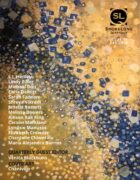This powerful story features a repetition of words and images, a dictatorial mother, a daughter whose hair is made more animate than herself. Does a story first come to you through a word, an image, or a character?
I approach stories through language. The words are never just a means to an end—they’re the story. I see plot as a vehicle for prose, which isn’t to say that plot is secondary—just that it’s easier for me to find the plot through language than through scene.
When I started writing this piece, I had only the title (I’d come up with it a while ago, but couldn’t find a place to use it); a vague idea of repeating structures that build on each other (similar to a memory game); and a vaguer idea about cultural obsessions with hair. I didn’t worry too much about where this was going. I try to let a piece develop organically and get out of its way. Mostly I fail—but the attempt helps.
Woven into the rhythm of this piece is the tyranny of the mother over her daughter. Can you share how you orchestrate rhythm and sound with the thoughts and actions of the characters?
I love the idea of “orchestrating rhythm and sound,” especially since the musicality of language is so crucial to my work. I learned music before I learned to write, which gave me a sense of when a beat was getting tedious and needed to be disrupted. Later, these disruptions also indicated where the story needed to change course—surprise in rhythm signaled surprise in plot.
I think of rhythm as the thematic heart of a piece—in this story, to claim something the way the mother claims her daughter’s hair involves a great deal of repetition—along with that circular, obsessive movement created by the refrain. I’m also obsessed with rhyme as a way of echoing disparate ideas in prose—it can be so surprising and musical, especially when it’s unexpected. And sometimes, the meaning of a scene changes when it’s interspersed with sentences from another scene—like with the pomegranates and lice, how “My fingers are stained with red” is a nod to both the red of the fruit and possible blood from her scalp. These elements were particularly useful in this story because of how subtle the violence needed to be—I didn’t want to villainize the mother altogether, only show both women as products of a system. And on paper—prose was my system.
In your work, parts of the body take on a life of their own. Talk about the themes most pressing to you regarding women’s lives and bodies.
I think of the body as you might think of clothing. Bodies are useful in that we can be seen with, and can show desire through, them. When that desire is subverted or oppressed, what will the body do? In a lot of my work, it turns on itself—becomes self-obsessed to re-establish control. When everything else has slipped away from us, it’s our flesh we’re left with. When we can touch nothing else—we’ll touch ourselves. Could there be a more powerful, violent way of saying—this is mine?
I’m interested in this kind of claiming, especially when it’s driven by cultural/familial oppression. We talk about sexual oppression in gendered terms, but the violence often builds where we start. And most often, it comes with love, with good intentions—it sneaks into your own flesh and makes everything you do either compliant or rebellious. I still struggle to find a way out of that.
Do you write in more than one language? If so, are there topics you address in one that you do not in the other?
For all I obsess over language, most of it eludes me. I count it a feat I’ve been able to achieve some fluency over one language—and one that isn’t even my mother-tongue—which will forever remain foreign to me. But even in English, I’m more comfortable with the abstract rhythms of prose than the physical reality of language. Despite everything, I’m an outsider to language.
I suppose this is why I’m drawn to poetry—there’s no better medium for a tongue looking to claim a language for itself. As a writer, the critical turning point came when I acknowledged all language was/could be poetry. A poem—after all—is only a signpost, a claiming—it’s both the most demanding and forgiving of mediums. It demands you take your work seriously—every choice you make has intention and meaning, right from the punctuation to capitalization to a line/paragraph break. But it also forgives gaps in logic—forgives my errored personalization of language. It’s the one place where being an outsider works in your favor.
Your nonfiction employs elements of fiction and poetry. When you begin to write, do you know what form or genre you want to use, or does the material decide for you?
I have a fluid understanding of form/genre, so it’s never occurred to me to decide which box a piece might fit into. The more I read, the more I discover the kind of work I’m drawn to doesn’t just subvert conventions—it lies outside them. And besides, doesn’t all our fiction stem from ourselves? Aren’t all stories metaphors for something “true?” And can you ever write an account of a true-story—won’t you always leave out some details, exaggerate others, and victimize/heroize yourself?
The second you apply language to an event, it ceases to be an event. You began to own it in a way that’s often dangerous. I don’t see how you can be factually honest in prose—so I’d say I try to be emotionally honest, but that statement implies I understand my emotions enough to present them accurately—which I don’t. So, I’ve learnt to accept that nothing I write—especially in “nonfiction”—will conform to my perception of what actually happened.
I think the best I can hope for is that my work is honest in that it reveals something about myself—whether or not I’m willing to accept it.


 A SmokeLong Summer 24!
A SmokeLong Summer 24!